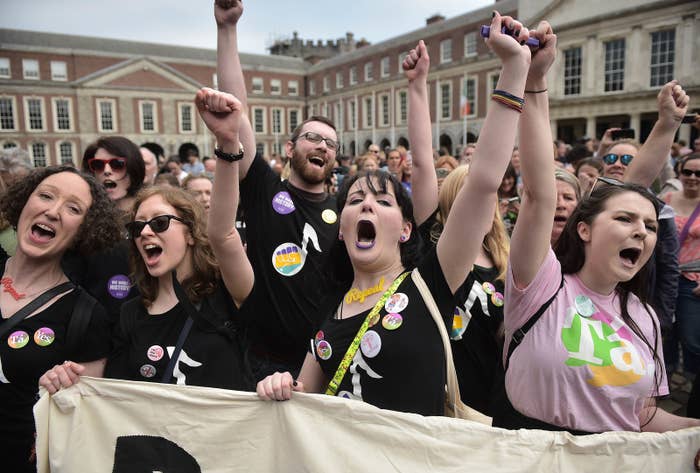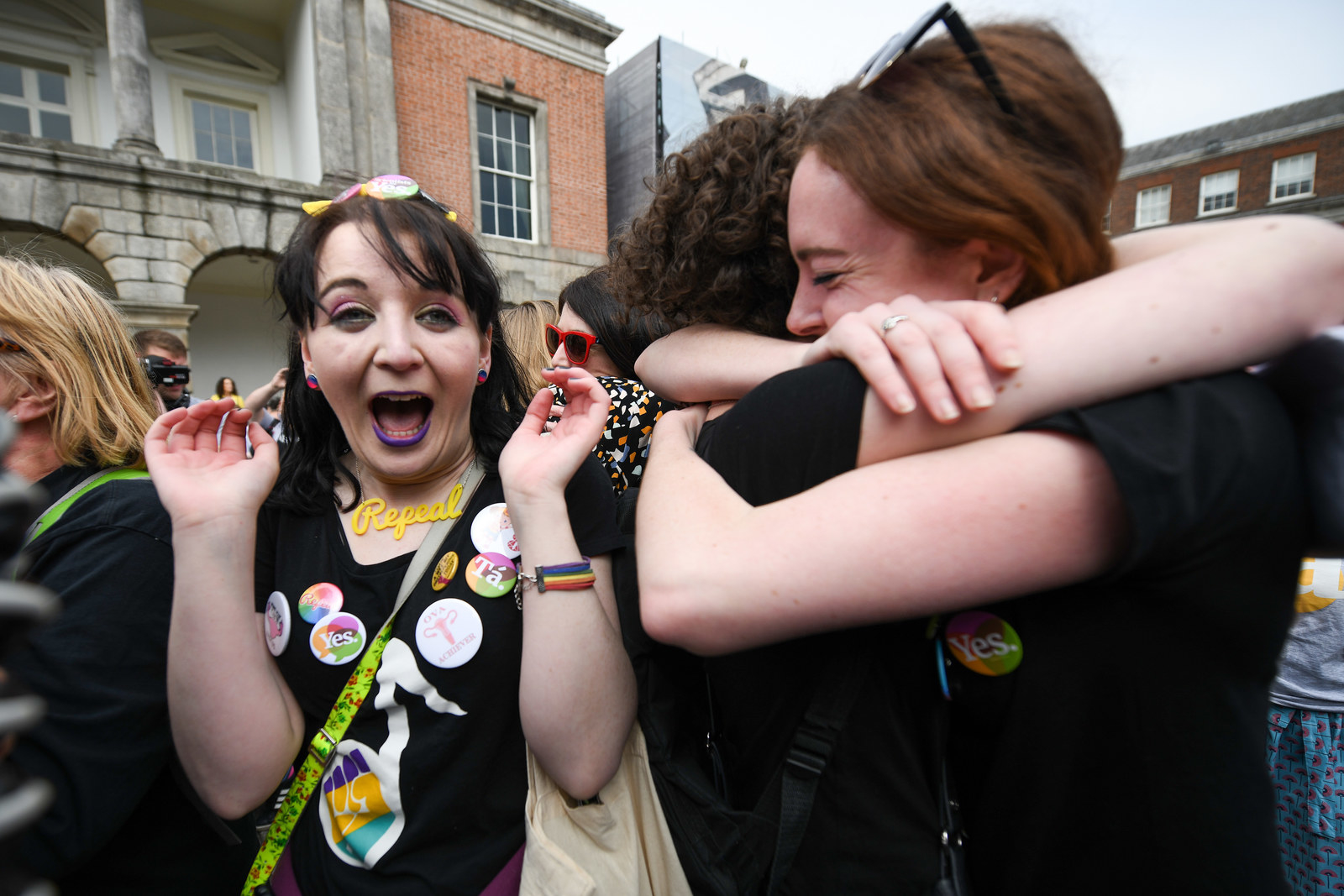
DUBLIN — Ireland's abortion laws will be relaxed after an overwhelming majority of voters chose to change the country's restrictive abortion laws in a referendum held on Friday.
Election officials announced Saturday that 66.4% (1,429,981) of those who cast their votes said "yes" to repealing the Eighth Amendment, the law that gave the unborn and the mother equal rights to life, which has until now meant that abortion was illegal in Ireland in almost all circumstances.
33.6% voters (723,632) were against repealing the amendment; had the No side won, abortion would have continued to be illegal in Ireland.
The referendum had a record turnout. 64.5% of more than 3 million people who registered to vote cast a ballot on Friday. In 2015's same-sex marriage referendum, which passed with 62% of the vote, turnout was 60.5%, itself a record high.
The Yes vote was highest in Dublin, which voted to repeal the Eighth with 75.5% of the vote.
Donegal in northwest Ireland was the only county to apparently reject liberalisation of abortion law – early tallies there showed a No vote of 51.9%.
Roscommon, which was the only place to vote against legalising same-sex marriage in 2015, and which is widely considered to be Ireland's most conservative county, backed the Yes vote with 57% of the vote, according to early tallies.
In all constituencies of Cork, the Yes vote was over 60%, reaching as much as 68% in south central Cork.

"100 years after women gained the right to vote, we have taken the decision to say we trust women and we respect women to make their own decisions and their own choices," taoiseach Leo Varadkar said at a press conference following the official announcement of the result.
Varadkar said this was a day when the Irish public had said "no more" to women in crisis pregnancies not having the health care they needed in their own country.
"No more to doctors telling their patients that there’s nothing that can be done for them in their own country, no more lonely journeys across the Irish sea," he continued.
"No more stigma as the veil of secrecy is lifted, and no more isolation as the burden of shame is gone.
"We voted to provide compassion where there was once a cold shoulder and to offer medical care where we once turned a blind eye," he said.
Leo Varadkar quoted Maya Angelou in honour of Irish women who have suffered because of the 8th amendment: “history despite its wrenching pain, cannot be unlived. But if faced with wrenching pain, it need not be lived again.” https://t.co/OyGHAk8Baz
Now that the public has voted to repeal the Eighth Amendment, the government will begin work to create new legislation for abortion in the country. It is not expected that this legislative process will be completed before at least the end of this year, although from Saturday the terms of the Eighth Amendment no longer apply.
Speaking at Dublin castle, where people had gathered for the official declaration of the result, the health minister Simon Harris told voters he had been "honoured" to lead the government's proposed reforms to abortion law. He described the landslide for the Yes campaign as "a powerful and emotional moment for people in this country".
"It means that the Irish people have voted to look after women in our own country with compassion and care," he told BuzzFeed News.
"Up until this point we had a situation under the Eighth Amendment where we were telling women in crisis pregnancy to take a plane or a boat; today we’re saying, take our hand."
Harris believed that speculation about a rural and urban divide on the vote had been an attempt by No campaigners to divide the country.
"The reality of the Eighth Amendment is that it has affected women in every county of Ireland, in big cities and small villages," he continued.
"What you saw was people in this country were thinking the issue through carefully, they were asking the questions, and they were listening, more importantly, to the experience of women.
"When it came to vote, whether you lived in rural or urban Ireland, you knew that the status quo couldn’t continue."
Fantastic crowds at Dublin Castle. Remarkable day. A quiet revolution has taken place, a great act of democracy.
Proposed legislation, which was published in March in order to inform the public's decision on whether to repeal the Eighth Amendment, would allow abortion for any reason up to 12 weeks. Thereafter abortion would be permitted until the foetus is viable when the pregnancy poses a threat to the mother’s life or health, or if the foetus is found to have a condition likely to lead to death before birth.
In cases of danger to the life or health of the mother, or where there's a condition likely to lead to death of the foetus, the approval of two doctors, including an obstetrician, must be sought. Only one doctor is needed to approve a termination of a pregnancy under 12 weeks’ gestation, but a 72-hour period between requesting and accessing termination would be required.
The 12-week clause was a particular area of focus for the anti-abortion campaign, which argued that it would lead to "abortion on demand" and that it was too extreme.

Abortion rights campaigners said that change was particularly necessary for abortion following rape or incest, as it would mean that police intervention would not be needed to approve access to abortion in such cases.
Julie O'Donoghue, who led Together for Yes's canvassing team in Roscommon, where the Yes vote won with an unexpectedly high 57% of the vote, told BuzzFeed News that this was a "historic" day.
"It’s an overwhelmingly positive day for the women of Roscommon, and for Ireland, of course," O'Donoghue said, speaking from her local count centre.
"It just goes to show that in the whole of Ireland there’s an appetite for change," she continued.
"There’s been a seismic shift in 35 years, and there isn’t the rural–urban divide that people were predicting. It’s a really proud day for Ireland."
In Dublin, crowds gathered at Dublin castle to celebrate the result.
Nicole Sheils was among those celebrating, and told BuzzFeed News she was "delighted" the Yes vote had won.
Yes voters are celebrating at Dublin Castle. "It’s monumental for everyone to have stood up and said 'that’s enough'," Nicole Shields told me. https://t.co/Amri3vVRQ0
"It was a big shock for me to see how much vote Yes were winning by," she said.
"The general attitude of shame around women’s sexuality in Ireland just has to stop. It’s monumental for everyone to have stood up and said, 'That’s enough.'"
Declan Hayes said he felt today's victory for the Yes campaign meant "the last Catholic provision remaining in the constitution," had been removed, and showed Ireland was shifting towards being a more secular society.
He said he wasn't surprised to see a win for repeal as he felt the No campaign had been flailing in its final stages.
"In the last week the No campaign seemed to be pivoting and struggling and getting desperate in their arguments, so I suspected it would be clear," Hayes said.
Caitlin Shipley told us she was surprised but pleased by the result. "There was no complacency with it," she said. "People were afraid that it would be much closer, so this is incredible.
"I’m proud of the amount of people, men as well, who’ve said women should have a choice over their own bodies."
No campaigners were disappointed, with Cora Sherlock, the deputy chairperson of the Pro Life Campaign, one of Ireland's largest anti-abortion groups, describing the result as "a sad day".
Today is a sad day for Ireland and for people who believe in genuine human rights. The struggle to defend the most vulnerable has not ended today, it's just changed. Thank you to all the incredible people who worked so hard to protect women and save babies. We fight on. #8thref
